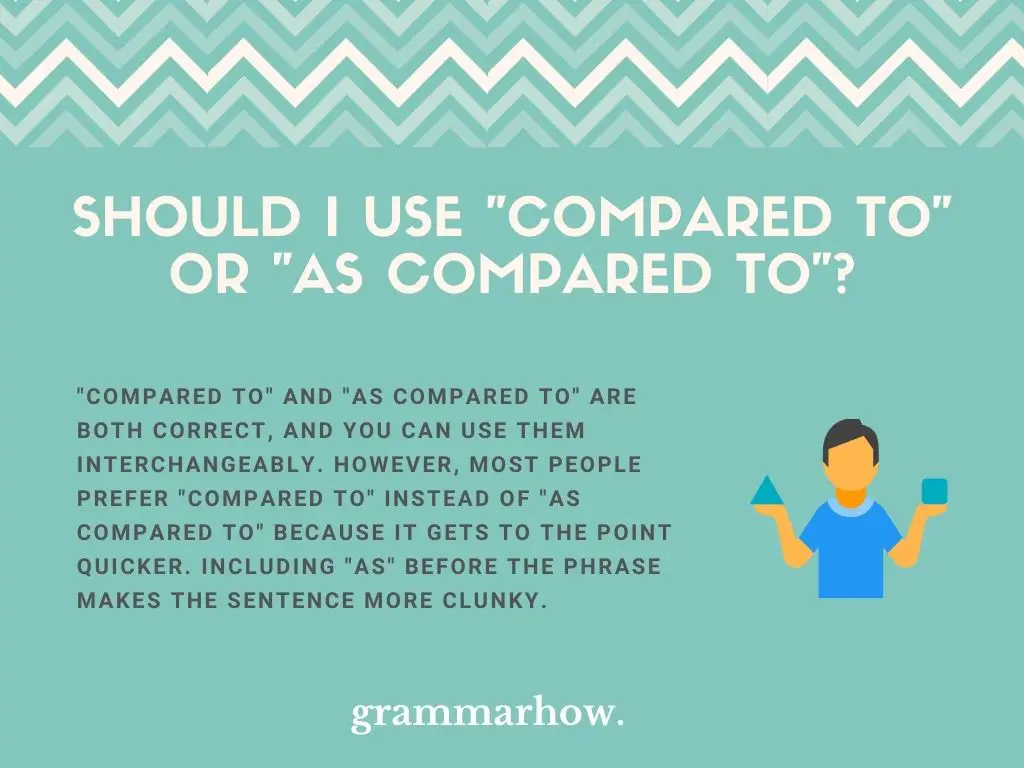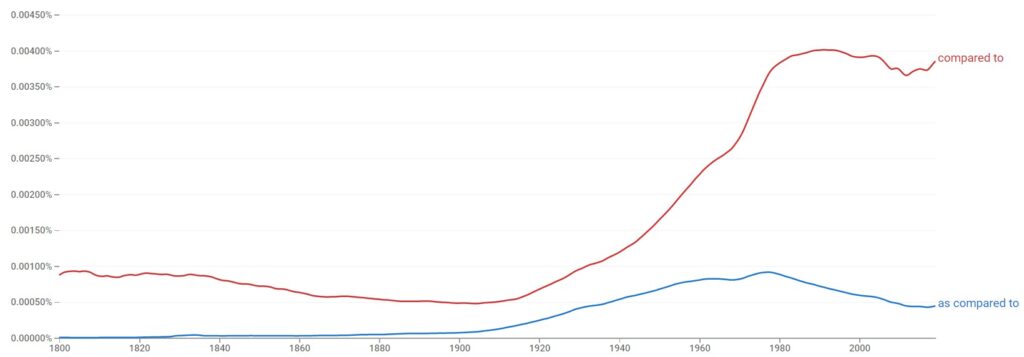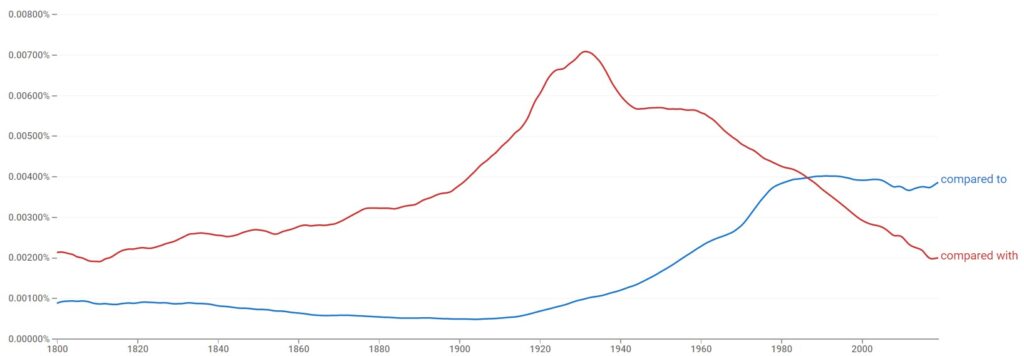When comparing two (or more) things, we might use the phrases “compared to” or “as compared to.” Generally, there isn’t much of a difference between either. This article will look at how you use them both, so you’re more comfortable doing so.
Should I Use “Compared To” Or “As Compared To”?
“Compared to” and “as compared to” are both correct, and you can use them interchangeably. However, most people prefer “compared to” instead of “as compared to” because it gets to the point quicker. Including “as” before the phrase makes the sentence more clunky.

The definition of “compare,” according to The Cambridge Dictionary, is “to examine or look for the difference between two or more things.”
Generally, “compared to” and “as compared to” are interchangeable. However, like most other cases in English, we want to focus on streamlining the language, so we remove redundant words like “as” when they add no extra information.
- This is big compared to that.
- This is big as compared to that.
While both of these examples are correct, “as compared to” is slightly more jarring for a native English speaker to read. You’re better off using “compared to” as the correct phrase.
Is “Compared To” Or “As Compared To” Used The Most?
To prove our point, we’ve got some statistics that we’d like to share with you. From there, you can see which of the two phrases is used more often.
According to Google, “Compared To” is mentioned 52,100 times on The New York Times website, while “As compared to” is mentioned 3,720 times.
Also, we can look at the graph to see that “compared to” is the most popular of the two phrases. It’s been the more popular choice throughout history, and the difference between usage of the two has only increased in the last few decades.

As we’ve mentioned, it’s important to keep redundancies out of English. For that reason, we tend to avoid using “as compared to.” There are no major differences between the two phrases that make “as compared to” more useful than “compared to” on its own.
Examples Of How To Use “Compared To” In A Sentence
“Compared to” is the most popular of the two phrases. It’s much more likely that you’ll come across this in written English, so we’ll focus most of the examples on showing you how we use it.
You should use “compared to” when you want to compare two or more things with each other. We typically included an adjective before it that we want to compare between two nouns.
- The profits of this charity are large compared to the profits of the other one.
- My best friend is kind compared to the people who claim to be my family.
- My family is rich compared to a lot of the families in this state.
- He says she is nasty compared to his former girlfriends.
- They are shy compared to the rest of their siblings.
- You are broke compared to me, and I can help you out financially if you need it.
- The government is corrupt compared to what they were ten years ago.
When we use “compared to,” we use an adjective like “large” or “kind” to compare two or more things with each other. We say that one thing is more “adjective” than the other by including “compared to.”
Sometimes, people make the following mistake:
- This is larger compared to the other one.
Here, we’re using a comparative adjective “larger” to talk about a comparison between two things. However, we’re already comparing with the phrase “compared to.” This turns into reduplication, which means we’re comparing more than we need to and is grammatically incorrect.
There are two ways you can avoid doing this. The first is to stick with the base form of the adjective:
- This is large compared to the other one.
The second is to keep the comparative adjective. In this case, we remove “compared to” and replace it with “than.”
- This is larger than the other one.
These are the only two ways you can compare two things with each other and be grammatically correct.
Examples Of How To Use “As Compared To” In A Sentence
As we’ve mentioned, “as compared to” is no different than “compared to.” The only main difference is that most native speakers avoid using it because it adds one too many words to the sentence and creates a clunky format.
“As compared to” is synonymous with “compared to.” You can use either one to compare two or more things, though it’s much more likely to use “compared to.”
- This is huge as compared to what I’ve seen previously.
- The government is rich as compared to the government of other countries.
- This party is fun as compared to the one my parent’s hosted for me.
- You are kind as compared to the rest of the people I’ve met.
- We are sad as compared to how we were three days ago.
- He is sweet as compared to my previous interests.
- This hobby is good as compared to your ones.
“As compared” to is difficult for native speakers to enjoy reading. You should make sure you don’t use it if you want to impress people with the contents of your writing.
However, grammatically speaking, there is nothing wrong with the phrase. If you prefer “as compared to,” you may use it however you want. We simply recommend that “compared to” is used instead.
Compared To – Synonyms
If you don’t like either of the phrases, we might have the solution for you. Synonyms and alternatives are great ways to expand your vocabulary and still convey the same meaning.
- As opposed to
- Contrasted to
- In contrast with
- Compared with
- In comparison to
- Contrary to
- Related to
- Relevant to
- As to
Most of these synonyms work well to replace “compared to.” Choose your favorite, and you can use them in a sentence to compare two or more nouns with each other.
Is It Ever Correct To Use “As Compare To”?
“As compare to” is never correct to use. When two things are compared in some way, we’re talking about them in the past tense (which is “compared”). This means we have to use “as compared to” and never the present tense “as compare to.”
However, there are cases where the simpler phrase “compare to” is correct. Since it’s the base form of “compare,” it’s relevant to understand when we use it in the present tense.
- Correct:This doesn’t compare to anything I’ve had before.
- Incorrect:This doesn’t as compare to anything I’ve had before.
As you can see, “compare to” is correct here, but “as compare to” is not.
Does “Compared To” And “In Comparison To” Mean The Same?
“Compared to” and “in comparison to” are interchangeable and mean the same thing. You can use both to compare two or more things with each other to see which one is more of something.
- This is good compared to that.
- This is good in comparison to that.
Generally, “in comparison to” is replaced with “compared to” for the same reason that we don’t use “as compared to.”
“In comparison to” is jarring and adds an extra word that we can avoid using if we simply say “compared to.” For that reason, you’re better off sticking to “compared to” when you need to use it.
Is There A Comma Before Compared?
There is not a comma before “compared.” It is a verb, so the sentence needs it to function properly, and for this reason, we don’t include any punctuation before it.
- Correct: Compared to you, I can’t catch a break!
- Incorrect: I’m nothing, compared to you!
- Correct: I get plenty of help compared to you.
- Incorrect: This is rough, compared to what I’ve experienced before.
A comma breaks up the flow of the sentence; therefore, it’s never correct to use one in this case.
Can You Start A Sentence With “Compared To”?
You can start a sentence with “compared to.” The sentence’s meaning is the same; we just bring the second part of the clause to the front and use a comma to split them. “As compared to” also works in the same way.
- These sweets are bad compared to the ones I had yesterday.
- Compared to the ones I had yesterday, these sweets are bad.
- You are boring as compared to most of the people on this course.
- As compared to most of the people on this course, you are boring.
What Preposition Is Used With Compared?
We can use “with” or “to” when we want to include a preposition with the verb “compared.” “Compared with” and “compared to” mean the same thing, and we use both to compare two or more things with each other.
According to this graph, “compared to” is the more popular choice, which is why we focused on it in this article. “Compared with” means the same thing, but it used to be more popular than it is today.

- This is fun compared to what I had to go through last week.
- This is fun compared with what I had to go through last week.

Martin holds a Master’s degree in Finance and International Business. He has six years of experience in professional communication with clients, executives, and colleagues. Furthermore, he has teaching experience from Aarhus University. Martin has been featured as an expert in communication and teaching on Forbes and Shopify. Read more about Martin here.
